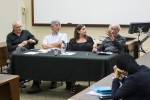The Center for the Study of International Migration hosted its inaugural lecture Friday, signifying the launch of the UCLA International Institute’s newest program.
The International Institute, which aims to promote research on global issues, expanded the center to better address international migration issues through lectures, an undergraduate club and a series of graduate student papers, said Marjorie Faulstich Orellana, the center’s associate director.
The goal of the center is to bring together scholars of all levels and facilitate the discussion of international migration issues Orellana said need to be addressed.
The inaugural lecture, titled “Migration Crises: At Home and Abroad,” featured three UCLA professors who discussed the challenges American and European refugees face when integrating into new countries and cultures.
The speakers also discussed problems migrants have faced in the past, following wars and mass migrations, and persecution issues that refugees in Europe are currently facing.
Asli Bali, a UCLA law professor who spoke at Friday’s lecture, said the majority of the Syrian population, many of whom are women and children, now live outside of Syria.
“Many of these refugees face difficult conditions as they flee the country, so the issue becomes a question of worldwide burden sharing,” Bali said.
The two other speakers, history professor Ivan Berend and law professor Hiroshi Motomura, also discussed what they called historically harsh migration circumstances. Motomura said refugees, migrants and immigrants continue to face persecution and rejection upon entering new countries.
Roger Waldinger, director of the center, said the program will continue to promote research on international migration by bringing scholars together to discuss these issues, but will now have official offices housed within the Institute.
Orellana said the center will continue to hold a bimonthly seminar series that will feature migration experts. In the spring, the center will begin to focus on family and education issues.
“During the lecture Friday, I think everyone struggled with what (we can do) now, but the first step is to be aware,” Orellana said. “If we understand the historical roots, the legal implications and the rights of refugees under the law, we can begin to spread awareness.”
The center will host its next lecture, called “The New Immigration Federalism,” in Moore Hall at noon on October 16.
